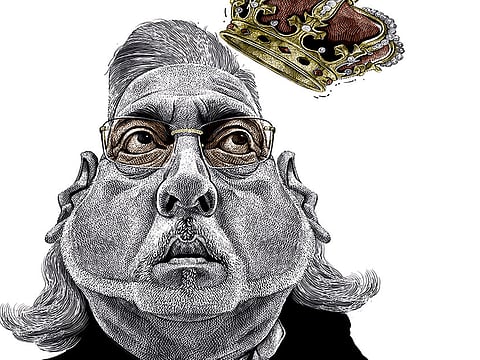The runaway king
As Mallya fights a battle for his reputation and extradition, it is a stunning fall from grace for a person whose name was ubiquitous with extravagance, glamour and privilege

At the height of his success, Vijay Mallya encouraged people to call him the ‘King of Good Times’. The flamboyant businessman lived it up and had India’s press eating out of his hands. A permanent fixture in the country’s socialite circles, Mallya was among India’s early celebrity billionaires in an age of electronic media. With investments in liquor, aviation and auto racing, there was a point when everything he touched literally turned into gold. Of course Mallya’s fairy tale rise was never going to be complete without an anti-hero in the story. As things turned out, the tycoon would play the role of the anti-hero himself!
Currently on the run from Indian authorities over charges of loan default worth billions, Mallya recently dropped a bombshell by telling reporters outside a London court that he met India’s Finance Minister Arun Jaitley before leaving the country and offered to settle his loans with the Indian banks. The statement stoked a huge political controversy with the Indian opposition demanding a “comprehensive probe” into the alleged role of the Prime Minister’s Office (PMO) and Finance Ministry for allowing Mallya to flee the country. Even in self-exile, it seems, the tycoon can rake up a storm.
Life has indeed come a full circle for Mallya who was born into wealth and educated at the prestigious La Martiniere School, in Kolkata. He went to St Xavier’s College, Kolkata, for higher studies and interned with pharmaceutical major Hoechst AG in the United States. At the age of 28, Mallya returned to India to take the reins of his father’s United Breweries Group. Over the decades, he was able to take the company to new heights. The group’s flagship product Kingfisher became synonymous with beer in India. With half the share of the country’s beer market, Kingfisher decided to go global. It is now available in more than 50 countries.
By 2003, Mallya set his eyes upon the lucrative civil aviation industry. This was the time when India, a country steeped in its socialist past, was boldly experimenting with its neo-liberal transformation. To fanfare and almost wall-to-wall media coverage, Mallya established Kingfisher Airlines in 2005, with plans to expand internationally. He wowed everyone at the Paris Air Show in 2007 with a $7 billion (Dh25.74 billion) order for 50 Airbus planes. The public adulation continued as Mallya announced India’s only F1 car racing team, Force India.
While his brazen public displays of wealth didn’t go down well with some, others began to question Mallya’s financial indiscipline. His company was falling behind on salary payments to its staff. Often compared to the British entrepreneur Richard Branson, Mallya realised that running an airline in a hugely competitive market like India was not easy. By 2012, Kingfisher Airlines’ debts were spiralling. He asked the banks to restructure his debt, and folded up the airline in 2012.
For someone used to untrammelled success — he single-handedly turned his family’s modest brewing business into a sprawling conglomerate — this was quite a setback. The loss of Kingfisher Airlines — a jewel in Mallya’s crown — came with its own woes. Owing more than $1 billion in loans to banks, the airline garnered bad press due to its inability to pay workers on time. With creditors and banks chasing him, the matter went to courts. Meanwhile, authorities raided a number of Mallya’s luxury properties across India. After facing an avalanche of unpaid bills and accusations of fraud, he fled to England in 2016.
Left smarting, the authorities in India swung into action. Mallya’s passport was cancelled and an official request for his extradition was made with the United Kingdom. India maintained that Kingfisher took out a series of loans from banks, including Industrial Development Bank of India, with the aim of palming off huge losses from Mallya’s failing airline. Authorities further claimed that he had no intention of repaying money borrowed from banks and the loans had been taken under false pretensions, on the basis of misleading securities with most of the money siphoned off. Mallya, of course, rebuffed all the charges.
Never the one to take it lying down, Mallya decided to fight the allegations and his eventual extradition to India in London’s Westminster Magistrates’ Court. After his sensational claims earlier this month, the Indian government was forced to deny the allegations. Arun Jaitley, who was India’s Finance Minister in 2016 (when Mallya left India) rubbished the liquor baron’s claim, noting that he had never given him any appointment and “the question of Mallya having met me does not arise”. Realms of newsprint and airtime devoted to Mallya’s claims and the official counter-claims during the last week prove that this story is not going to go away anytime soon.
From a darling of the media to one of India’s most infamous economic fugitives, Mallya has become a bit of a liability for the UK too. With assets worth hundreds of millions in England and Wales, courts in the UK have recently paved the way for authorities to seize some of it to recover the loans he took. The Enforcement Directorate in India is mulling to sell Mallya’s stake in United Breweries and United Spirits. This would be the first major move by the enforcement agency where the beleaguered businessman’s shares could be sold in the open market. As Mallya fights a battle for his reputation and extradition, this is a stunning fall from grace for a person whose name was once ubiquitous with extravagance, glamour and privilege. The dethroning of the ‘King of Good Times’, it appears, is near complete.
Sign up for the Daily Briefing
Get the latest news and updates straight to your inbox


